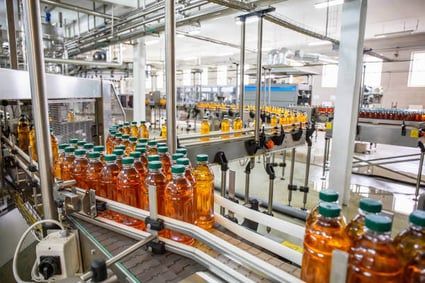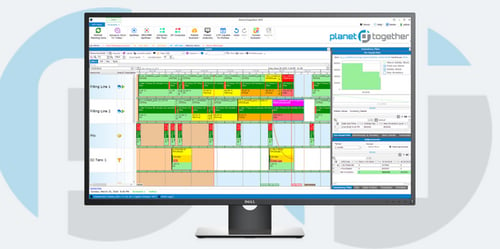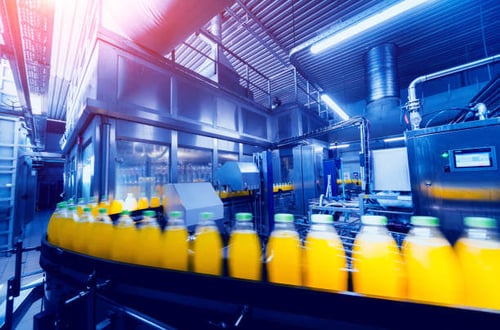Enhancing Production Flow for Faster Time to Market: Integrating PlanetTogether APS with ERP Systems
In food and beverage manufacturing, time to market is a critical factor in maintaining a competitive edge. Consumer preferences shift rapidly, regulatory requirements evolve, and supply chain disruptions add layers of complexity to production planning. For Production Schedulers in food and beverage manufacturing, optimizing production flow is essential for meeting demand while minimizing waste, inefficiencies, and downtime.
This blog explores how integrating PlanetTogether APS with ERP systems like SAP, Oracle, Microsoft, Kinaxis, or Aveva can enhance production scheduling, improve resource allocation, and accelerate time to market.

Understanding the Importance of Production Flow
Production flow refers to the seamless movement of raw materials, components, and finished goods through the manufacturing process. A well-optimized production flow ensures that ingredients arrive just in time, machines run at peak efficiency, and bottlenecks are eliminated before they impact fulfillment schedules.
In the food and beverage industry, factors like perishability, seasonal demand fluctuations, and regulatory compliance further complicate production scheduling. Without real-time visibility and coordination across production lines, delays can escalate, leading to spoilage, higher operational costs, and missed market opportunities.
Challenges in Achieving an Efficient Production Flow
Variability in Raw Material Availability: Supply chain disruptions, ingredient quality issues, or seasonal shortages can create scheduling conflicts.
Unplanned Downtime: Equipment failures or maintenance can disrupt production sequencing, delaying shipments.
Regulatory and Quality Compliance: Stringent food safety laws and compliance standards require precise monitoring and traceability.
High Product Mix Complexity: Managing different SKUs, recipe variations, and packaging formats complicates production planning.
Lack of Synchronization Between Departments: Disconnected production, procurement, and distribution plans cause inefficiencies.

How PlanetTogether APS and ERP Integration Accelerate Time to Market
Advanced Planning and Scheduling (APS) software like PlanetTogether, when integrated with ERP systems such as SAP, Oracle, Microsoft, Kinaxis, or Aveva, enables production schedulers to optimize workflows in real time. Here’s how:
1. Real-Time Production Visibility
Integration between PlanetTogether APS and ERP platforms provides a centralized view of production schedules, resource availability, and demand forecasts. Production Schedulers can make proactive decisions based on live data, reducing the risk of delays.
For example, when an ERP system like SAP detects a delay in raw material delivery, PlanetTogether can automatically adjust production sequences to minimize idle time and keep lines moving efficiently.
2. Optimized Scheduling for Maximum Throughput
Traditional scheduling methods often rely on static spreadsheets that lack the flexibility to adapt to sudden changes. PlanetTogether APS, integrated with Oracle or Microsoft ERP solutions, uses intelligent algorithms to optimize sequencing, reduce changeover times, and improve machine utilization.
For a beverage manufacturer juggling multiple product lines, APS integration enables scheduling that minimizes flavor cross-contamination and allergen exposure while maintaining high throughput.
3. Enhanced Resource Allocation and Capacity Planning
Through integration with Kinaxis or Aveva, PlanetTogether APS allows Production Schedulers to balance workloads across multiple production sites, ensuring that resources such as labor, machinery, and utilities are efficiently utilized. This prevents bottlenecks and enhances overall equipment effectiveness (OEE).
For example, a food processor experiencing a spike in demand for a new plant-based product can dynamically allocate production capacity to meet increased orders without overburdening existing lines.
4. Agile Response to Market Demands
Consumer demand can shift rapidly due to trends, promotions, or unforeseen events. PlanetTogether APS, when integrated with ERP systems, enables agile adjustments to production schedules based on demand forecasting, sales data, and supply chain constraints.
For instance, if an unexpected spike in demand for organic juice occurs due to a health trend, the system can prioritize production runs accordingly while adjusting procurement and inventory levels in sync.
5. Improved Compliance and Traceability
Food safety regulations require detailed record-keeping of ingredients, processing conditions, and product distribution. PlanetTogether APS, integrated with SAP or Oracle ERP systems, provides end-to-end traceability, ensuring compliance with regulatory standards like FDA, HACCP, and FSMA.
In the event of a recall, this integration allows manufacturers to quickly trace affected batches and mitigate risks without halting full-scale production.
Steps to Implement Integrated Production Scheduling
To successfully enhance production flow and accelerate time to market, food and beverage manufacturers should follow these steps:
Assess Current Production Processes: Identify bottlenecks, inefficiencies, and gaps in scheduling capabilities.
Implement APS-ERP Integration: Connect PlanetTogether APS with your ERP system (SAP, Oracle, Microsoft, Kinaxis, or Aveva) to centralize data and enable automation.
Leverage Advanced Analytics: Use real-time insights to optimize production flow, reduce waste, and maximize efficiency.
Train Teams on System Utilization: Ensure schedulers, planners, and operations personnel are equipped to use the integrated platform effectively.
Continuously Monitor and Improve: Regularly review performance metrics and refine scheduling strategies to stay ahead of market demands.
For Production Schedulers in food and beverage manufacturing, an optimized production flow is essential for reducing lead times and increasing market responsiveness. Integrating PlanetTogether APS with ERP systems like SAP, Oracle, Microsoft, Kinaxis, or Aveva empowers manufacturers with real-time scheduling, enhanced resource management, and greater agility in meeting customer demands.
By adopting PlanetTogether APS-ERP integration strategy, manufacturers can streamline production, minimize waste, and ensure faster time to market, all while maintaining high product quality and compliance standards. The future of food and beverage manufacturing belongs to those who can seamlessly integrate technology to drive efficiency and profitability.
Are you ready to take your manufacturing operations to the next level? Contact us today to learn more about how PlanetTogether can help you achieve your goals and drive success in your industry.
Topics: PlanetTogether Software, Integrating PlanetTogether, Improved Compliance and Traceability, Real-Time Production Visibility, Food and Beverage Manufacturing, Agile Response to Market Demands, Optimized Scheduling for Maximum Throughput, Enhanced Resource Allocation and Capacity Planning





















LEAVE A COMMENT